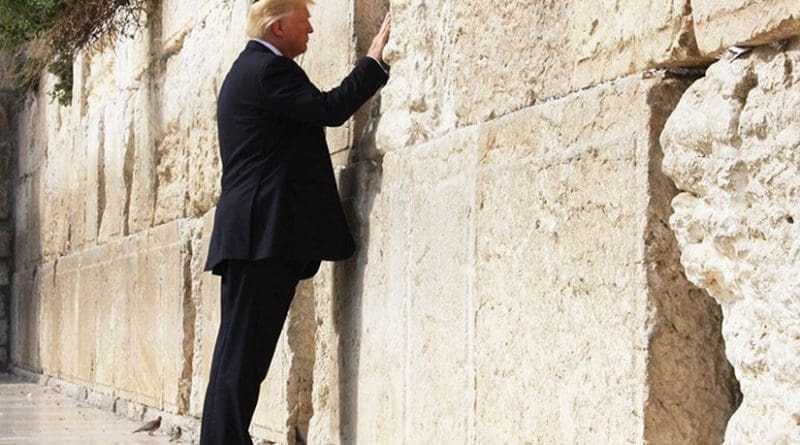O Jerusalem! Trump Crosses The Rubicon – Analysis
By Observer Research Foundation
By Pinak Ranjan Chakravarty
In a stunning reversal of American policy, US President Donald Trump has announced that his administration will formally recognise Jerusalem as Israel’s capital and shift the American Embassy from Tel Aviv to Jerusalem. By this volte face, Trump has again underlined his role as a leader who revels in taking crucial foreign policy decisions that rock the international consensus.
Trump had earlier sent shockwaves by exiting the Climate Change Agreement, FTA agreements like the TTIP (Transatlantic Trade and Investment Partnership) and the TPP (Trans-Pacific Partnership). He has tried to undercut the nuclear deal with Iran and has succeeded in tightening immigration rules for selected Muslim countries.
Has Trump Pushed the Region Towards Chaos?
As a sop, Trump did not take any position on other final status issues like return of Palestinian refugees, finalisation of borders and vowed to do everything in his power to forge a peace deal.
America’s European allies are unlikely to support Trump’s decision which has added more fuel to the fires already raging in the volatile West Asian region. It will be seen as another anti-Muslim move and will be projected as such. USA’s Arab allies will be squirming. Iran and her allies will be preparing to leverage the anti-American wave that has begun to sweep across the Arab world.
The Chief Palestinian negotiator, Saeb Erekat, condemned Trump’s decision as having “destroyed any possibility of peace” and was “pushing this region towards chaos [and] violence”.
UN General Assembly: Barometer of Global Opinion
Global reaction has been consistently adverse, including from the USA’s European allies. As for Israeli PM Benjamin Netanyahu, this decision has thrown him a lifeline while he is embroiled in corruption cases. A UNSC meeting called to discuss this issue is unlikely to achieve anything, in view of the USA’s veto power.
India’s reaction has been low-key, basically reiterating its longstanding position and asserting that third party actions will not influence India’s decision. Significantly, the official Indian statement also asserts that “it is shaped by our views and interests”.
India Can’t Go Trump’s Way
In essence, India will not support Trump’s decision and stick to its traditional stand of supporting a two-state solution within secure borders, with East Jerusalem as the Capital of Palestine. Notwithstanding India’s growing strategic ties with the USA and close relations with Israel, India cannot go down the road that Trump has chosen.
India has successfully navigated the minefield of the Arab-Israeli divide for more than two-and-a-half decades. Today, India has excellent relations with all Arab countries and regional powers, Iran and Israel. This is no mean achievement and is a clear recognition of the fact that the countries of West Asia value India’s role.
It is unlikely that India’s position will have any impact on the growing ties with either the USA or Israel. India’s balanced policy in the West Asian region is well understood and appreciated.
India has had differences with the USA and Israel over many issues but as mature democracies these are handled as part and parcel of bilateral relations with these two and other countries. India will certainly vote against this move in the UN.
Extremist Islamic Outfits Riled Up
Hamas, regarded as a terrorist organisation by both Israel and the USA, remains in control of the Gaza strip. It will now find renewed support among Palestinians. The Palestinian Authority, headed by Mahmoud Abbas, though at loggerheads with the Hamas, will now find common ground on this issue. Hamas has appealed for another uprising or “Intifada”.
Extremist Islamic outfits have called for terrorist strikes against the USA and Hezbollah has demanded that all Arab and Muslim countries sever ties with the USA. Islamic countries will project this as an affront to the Muslims and the Christians too will find it unpalatable. The Pope has spoken out against it.
The international community had got used to the default position on the status of Jerusalem – ie its legal status will be decided when peace negotiations between the Israelis and Palestinians finally conclude. The UN partition plan of 1948 had kept Jerusalem an international city.
East Jerusalem was under Jordanian rule, till its capture by Israeli forces in 1967. West Jerusalem has been with Israel since 1948. Because of the disputed nature of the city, all foreign embassies in Israel are located in the coastal city of Tel Aviv. Only two embassies are located in Jerusalem apart from consulates.
Will Trump’s Decision De-escalate Peace Process?
Trump’s decision seems to be payback to his Christian evangelist supporters and the Jewish lobby, which funded his election campaign lavishly. Trump has tried to justify his decision by saying it was merely recognition of an existing reality.
For all practical purposes, West Jerusalem has functioned as the seat of Israeli government since 1948. Palestinians want East Jerusalem as the capital of an independent Palestine. This decision will make any American role, as a peace-broker, hugely suspect in the eyes of Palestinians.
Will this decision help revive the peace process? Very unlikely, if the Trump administration is basically falling in line with Israel’s stated objective of making the whole of Jerusalem as its eternal capital and giving the Palestinians some limited autonomy – in truncated territorial areas which are no longer contiguous. Israel’s confiscation of Palestinian land for building Israeli settlements in occupied territories has made a viable Palestinian state almost impossible.
Arab and Muslim countries will find it politically unacceptable to acquiesce in such an arrangement and the Arab-Israeli divide is sure to endure for decades to come.
This article originally appeared in The Quint.

